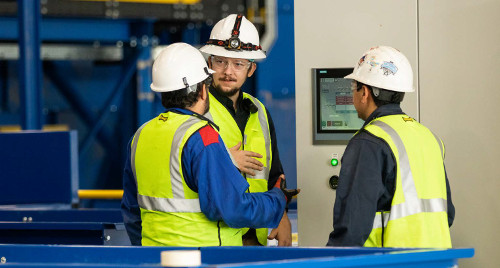 by Josh Robbins, System Startup Specialist
by Josh Robbins, System Startup Specialist1. What is the No. 1 challenge that every MRF faces, and how can they mitigate it?
Contamination. Year to year we are seeing more and more items in single stream that are not supposed to be there. Bowling balls, electrical cords, etc. To get a head start on capturing these items, put a tip floor spotter on the floor. When a truck offloads, have them pull those items into a separate pile. A good loader/operator will feather through the material and grab some of those items before they make it up to your line. Then your presort line stands a better chance of finding the rest of the materials that could harm your sorting equipment.
2. What are the top three things a MRF should have in place prior to starting up?

Proper safety training is invaluable. Workers that get hired from different industries sometimes do not know the standards for safety in a MRF. We make our equipment very safe to work on and around, but they need to be aware of the plant policies. Have the proper safety equipment and tools for them to work on equipment safely. A good CMMS (computerized maintenance management system) program will help you maintain your equipment on a daily or hourly basis. Keep a good spare part inventory so you don’t find yourself losing productivity due to frequent orders.
3. What should the MRF’s focus and expectations be in the first few weeks of operations?
The first few weeks are when operations personnel learn the HMI interface. It takes time for someone to learn the system and be able to make the right adjustments. A common misconception is that right at startup the quality and uptime is optimal. Once we introduce material we will start going through and optimizing products. Any issue we see we will shut down the system to teach operations how to make the proper adjustments to fix it.
4. What are the things that all top performing MRFs have in common?
I tell all of our customers: Start a good housekeeping regimen now and stick to it. The MRFs that do this are able to maintain very organized operations. If you let it get out of hand, it will take longer and cost you more to get back on track. A good CMMS will help your maintenance staff stay on top of critical items. Also, plan for downtime to allow your maintenance staff the opportunity to address things that need to be repaired or replaced. And finally, involved management. Managers who take the time to understand how their system actually works make the place operate more effectively.
5. If you were hiring for a new MRF, what skills would you look for in potential managers?
MRFs are getting more advanced, so for an operations manager I would look for someone open to new ways of doing things—not the ways of five to 10 years ago. They need excellent communication skills to lead the crew. Maintenance managers need to know the importance of preventive maintenance. I see a lot of plants waiting until something breaks and then spending more on parts and losing uptime. There should be an attitude of caring for the equipment so it does not break.
